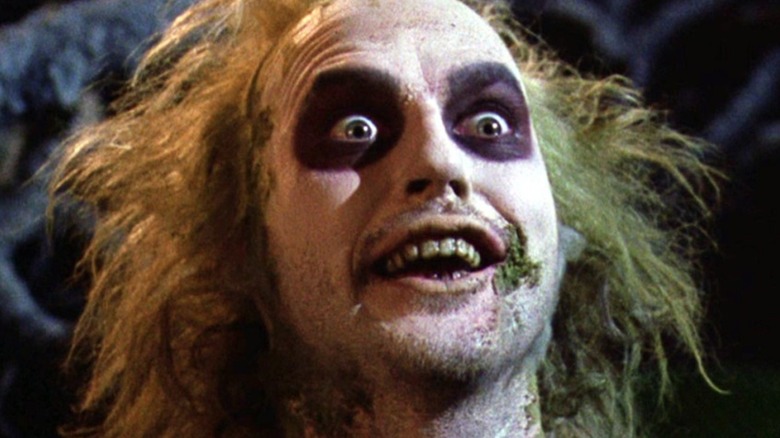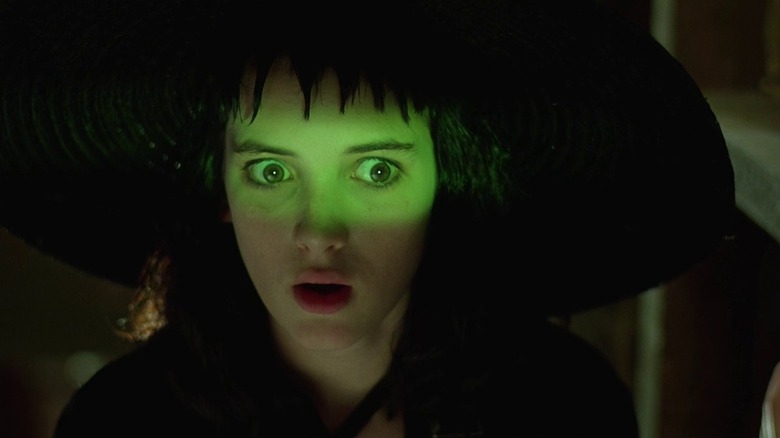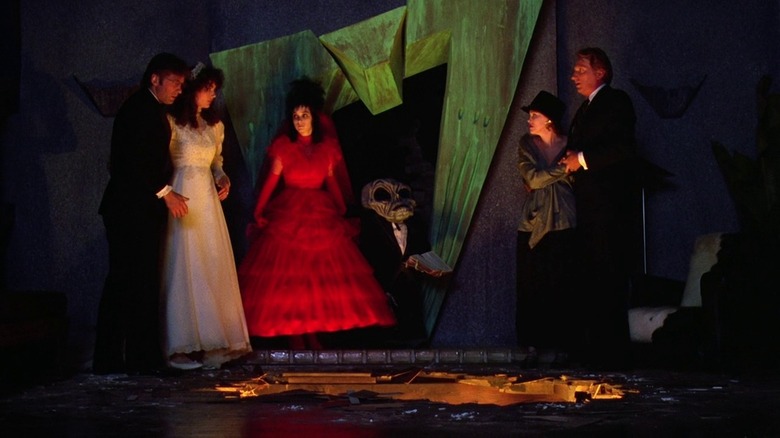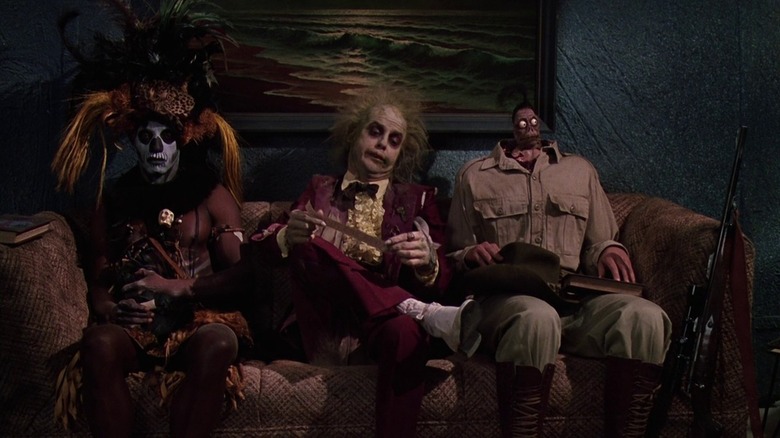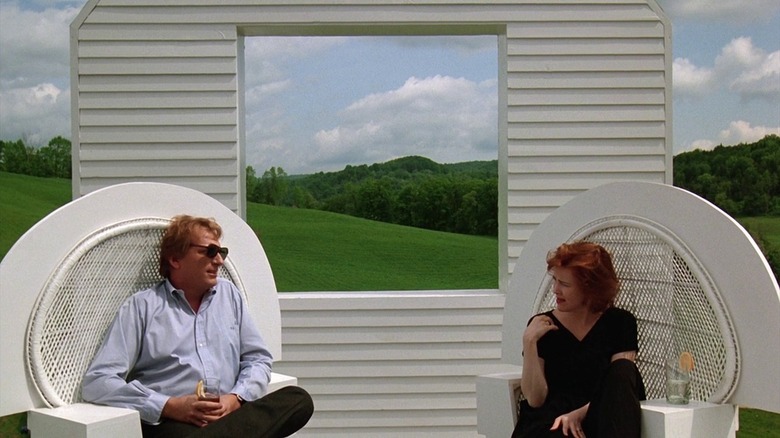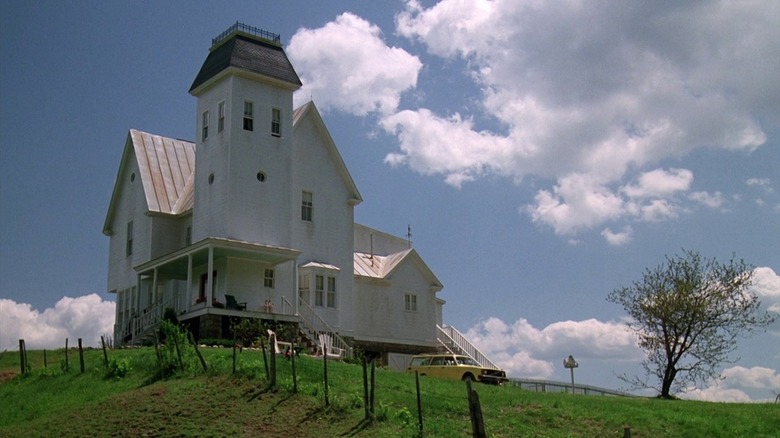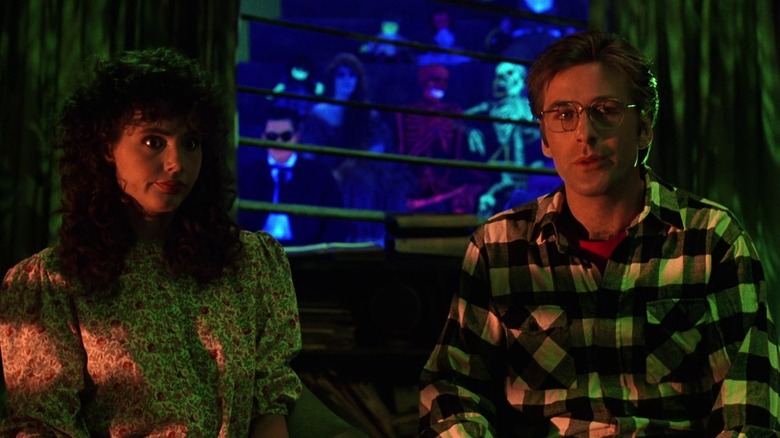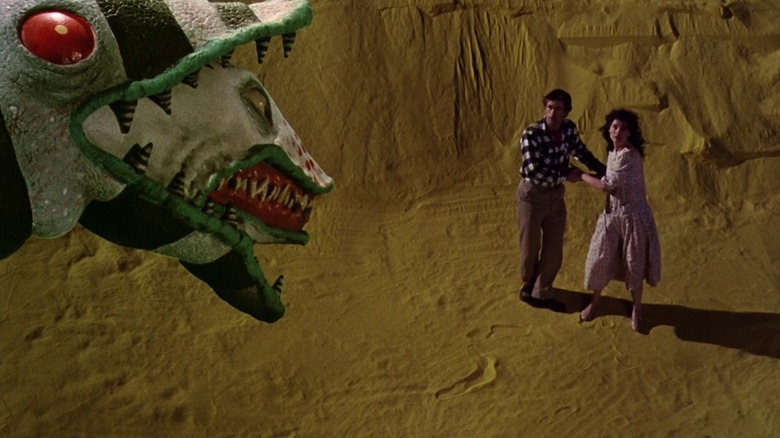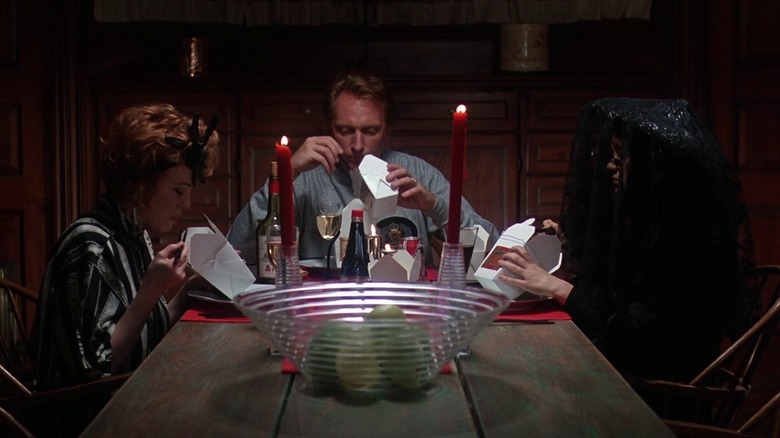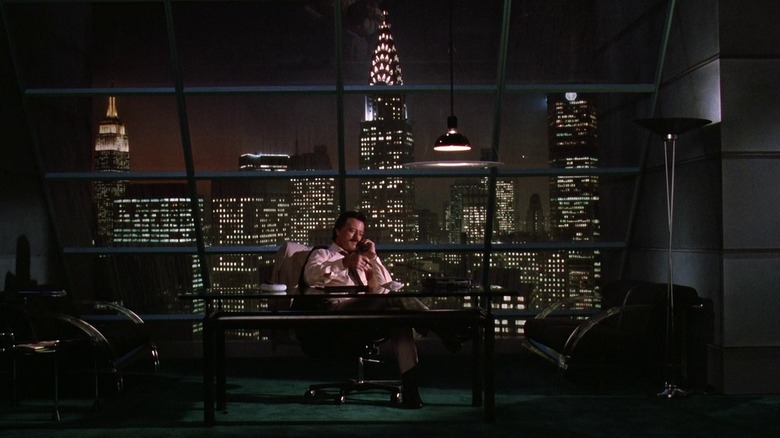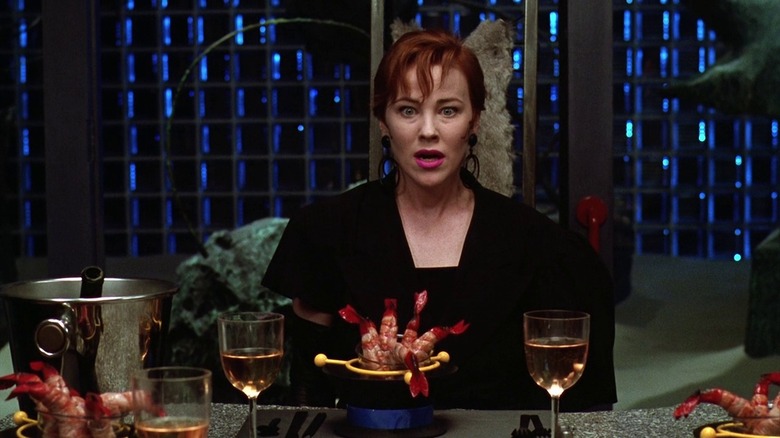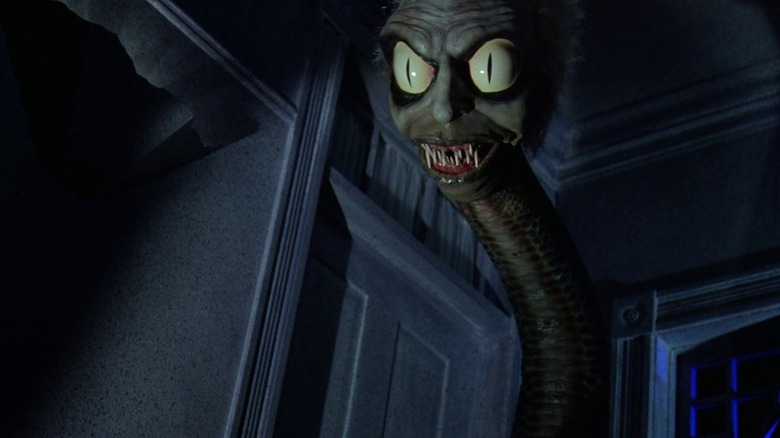The Ending Of Beetlejuice Explained
Tim Burton has made plenty of movies over the course of his career, but his second go in the director's chair holds a special place in the hearts of his fans. "Beetlejuice" is truly a one-of-a-kind story. Lydia Deetz finds her life changed forever when her family moves into a haunted house. The house's resident ghosts, Adam and Barbara Maitland, are friendly enough, but they want to be left alone to enjoy their afterlife in peace — and Lydia's business-minded father and avant-garde artist stepmother pose a serious threat to their serenity. They employ a certain bio-exorcist to help push the Deetzes out of their home and, well, all hell breaks loose.
The cast of "Beetlejuice" includes Winona Ryder, Alec Baldwin, Geena Davis, Catherine O'Hara, and of course, Michael Keaton as the titular Betelgeuse. Their talents, against a backdrop of a hilarious script and some truly out-of-this-world visuals, create a film that's maintained its status as a classic for more than 30 years.
There have been whispers of a sequel ever since "Beetlejuice" debuted in 1988, but an announcement from Brad Pitt's production company renewed interest in returning to Burton's ghostly world in early 2022 (via Deadline). Any sequel would have to deal with some hanging plot threads left by the original, but whether or not Burton and his cast return to clear things up, we've got the ending of "Beetlejuice" explained right here.
Did Lydia really need Betelgeuse to save the Maitlands?
In the film's climax, Otho is using "The Handbook for the Recently Deceased" to try and contact the afterlife (for profit, of course), but in the process he ends up performing nearly an entire exorcism on Adam and Barbara Maitland. As her friends are decaying before her eyes, Lydia panics, and the only thing that she can think to do to save them is ask Betelgeuse for help.
Betelgeuse agrees to save the Maitlands, but naturally his help comes with a catch. He'll only save the day if Lydia will agree to marry him. The following chain of events is delightfully kooky in a way only the best Tim Burton films can pull off, and it also gives us one of the most twisted wedding scenes in movie history. The whole situation makes for a fantastic viewing experience, but did any of it even need to happen in the first place?
When Lydia agrees to marry Betelgeuse, the poltergeist pops into her home and starts causing chaos. In the immediate aftermath of Betelgeuse's arrival, Otho's mystical séance is disrupted and the Maitlands are able to move around of their own free will again. After that, Betelgeuse is entirely focused on the wedding. It really doesn't seem like he did anything Lydia couldn't have done on her own, but considering she's just a kid, she gets a pass on impulsive decision making.
Why did Betelgeuse want to marry Lydia?
Betelgeuse agrees to help Lydia save the Maitlands if she'll marry him, but his reasons for wanting to get hitched in the first place aren't exactly clear. The movie has already shown that Betelgeuse has a particularly difficult time getting to enter the world of the living to cause mischief. Seemingly the only way for him to get out and stretch his legs is for someone to repeat his name three times in a row.
The movie doesn't show much of what Betelgeuse gets up to when he hasn't been summoned, but considering his desperation to get the Maitlands to hire him earlier in the film, it's safe to assume he finds his daily life pretty boring. When Lydia asks for help, Betelgeuse says that by being married to a mortal, he'll be able to spend as much time in the world of the living as he wants, but it's never made clear why that's something he really wants.
Part of the confusion might be due to some rewrites that happened on the "Beetlejuice" script. Michael McDowell wrote the original screenplay for the film, and before Warren Skaaren stepped in to make revisions, the storyline was much, much darker (via Consequence). In McDowell's version, Betelgeuse was a winged demon who wanted to keep Lydia for himself, and many of the deaths in the film were much more violent. Skaaren's edits may leave some of Betelgeuse's motivations a little muddled, but they make for a much more approachable film overall.
Will Betelgeuse get punished?
It's clear throughout the film that Betelgeuse occupies a special place in the land of the undead. Not only is he the only ghost who appears to have strict rules tied to his appearances, he's also the only one that appears to strike fear (or at least concern) in the heart of Juno, the Maitlands' tough-as-nails caseworker.
At the end of the film, Betelgeuse is sitting in the afterlife's waiting room, and his ticket number indicates that he'll be waiting for a very long time. What isn't clear is why he's waiting there, or what exactly is going to happen to him when he finally gets to his appointment. For as much time as the film spends in the offices of the afterlife's bureaucracy, there's still no clear sense of how things actually work down there.
It could be that being forced to wait centuries for a scolding from Juno is all the punishment that Betelgeuse receives, or maybe there's an afterlife equivalent of community service that will have him working as the new afterlife receptionist for half a millennium. Either way, Betelgeuse isn't going to be happy about it, and clearly he'll try every trick in his book to get out of serving his time, even if it doesn't work out for him.
Will the Deetzes stay in their new home?
Lydia's parents Charles and Delia Deetz have each moved into the Matilands' former home for different reasons. Charles wants to find a place where he can escape the busy life of the city and finally get a chance to relax. Delia hopes to experiment with her most artistic impulses, which include making some intense modifications to the house.
The two of them sink plenty of time and money into their new home. Delia remodels just about every aspect of the house, and the two of them also risk their lives dealing with ghosts and nearly lose their daughter to Betelgeuse's wedding scheme. After all that work and sacrifice, you might expect them to try and hold onto the house forever, but despite how "Beetlejuice" ends, there's one fairly solid indication that before too long, the Deetzes will leave Winter River behind.
For decades, there's been talk about making a "Beetlejuice" sequel, but in the early '90s screenwriter Jonathan Gem wrote an entire script for a follow-up (via Far Out Magazine). The script was called "Beetlejuice Goes Hawaiian," and as the title implies, it begins with the Deetzes moving out to Hawaii to build their very own resort. Obviously the film never saw the light of day, but the existence of the screenplay gives a small hint to what Lydia and her family might have been doing after the original film ended.
How did the house get back to normal?
There are so many small details that make "Beetlejuice" a memorable movie, but the intricate designs of the film's sets definitely stand out. Between Adam's tiny model of Winter River to the offices of the afterlife, there are plenty of great locations in the film, but the wildest visuals arrive when Delia Deetz completes her full remodel of the Maitlands' home.
Delia's designs are marked by sharp angles, bizarre structures, high-contrast colors, and a healthy dash of indoor plants. When she's finished doing her work on the home, it looks like something a modern interior designer might have a nightmare about after eating too much pizza right before bed. Delia must have spent a small fortune reworking the place, but in the final scene of the film, the ground floor appears to have been reverted to the way it looked when the Maitlands lived there.
None of the characters comment on the sudden change to the house, but the reasoning behind it actually seems pretty clear. After nearly exorcizing Adam and Barbara at the film's climax, Lydia's parents have found a way to coexist with their home's ghostly inhabitants. The Maitlands really care about Lydia, and their close bond has likely inspired Lydia's parents to agree to a compromise that saw at least some parts of the house go back to the way the Maitlands had designed them when they were alive. Besides, Delia might already be eyeballing a piece of property in Hawaii.
Do Adam and Barbara get to live in the house forever?
The rules of the afterlife are a big focus in "Beetlejuice," but that doesn't mean that they're all that clearly defined. Early in the film, Adam and Barbara get their hands on a copy of "The Handbook for the Recently Deceased," but despite all their best efforts, the two struggle to understand everything that the book tries to explain to them. They learn firsthand that leaving their home puts them at the mercy of monstrous sandworms, and they figure out how to access the afterlife's central offices by drawing a door on a wall. Beyond that, the Maitlands are basically guessing their way through the entire film.
When they meet with their caseworker Juno, she tells them that getting humans out of their home is their own responsibility, and that they have to stay in their house for 125 years. That opens up even more questions. What happens when those 125 years are up? What happens when people without a home die? What if a ghost's home gets demolished at some point? But it does mean that we know Adam and Barbara get to live out their afterlives together in the home they built in Winter River.
What's the deal with the sandworms?
From beginning to end, "Beetlejuice" is packed with stunning imagery, but few of the movie's wild inventions stick out like the giant worms that roam the afterlife's limbo space. When Adam and Barbara first attempt to leave their home, they find themselves in a large desert-like space that Betelgeuse himself later refers to as Saturn. Roaming the desert are black-and-white striped worms that viciously attack anything they encounter. Thanks to the land's appearance and Barbara's dramatic worm ride during the film's climax, fans frequently compare the creatures to the sandworms of "Dune." Even in a film as imaginative as "Beetlejuice," the worms come from out of left field, but over the years they've become arguably just as emblematic of the film as Betelgeuse himself. Oddly enough, they weren't originally supposed to be in the movie at all.
Before Warren Skaaren stepped in to rework the film's script, screenwriter Michael McDowell had envisioned a very different limbo for "Beetlejuice." In McDowell's original script, limbo was more of an empty void than an expansive desert. Instead of being guarded by vicious worms, giant clocks and sentient gears whirled through the void, spewing ooze and destruction in their wake. Eventually Skaaren's changes led to a variety of limbos appearing in the film, with the most iconic being the area around Saturn with its monstrous worms.
Are Adam and Barbara raising Lydia?
Throughout "Beetlejuice" it's obvious that Lydia's relationship with her parents is strained at best. Her stepmother Delia seems openly antagonistic to her, and her father Charles is basically an absent parent despite living in the same house as his daughter. Lydia develops a close relationship with Adam and Barbara, and they're really the only people that she seems to have any connection to.
At the climax of the film, Lydia saves Adam and Barbara from an exorcism, narrowly avoids being married off to Betelgeuse, and, incidentally, proves the existence of ghosts to her parents. Unsurprisingly, neither of the adult Deetzes get much screen time near the end of the film, so there's really no telling how they reacted to everything that happened at their home.
What really matters at the end of the movie isn't how Lydia's parents feel about the situation, but that Lydia herself has managed to save her friends, who are now making sure she's doing well in school and letting her have levitating dance parties. The Maitlands aren't really raising Lydia, per se, but she finally has adults in her life who are actually looking out for her best interests. (Of course, that makes it all the more heartbreaking to imagine her parents relocating to Hawaii before too long.)
Will the house become a tourist destination?
After Betelgeuse makes his first attack on the Deetzes, Delia and Charles get an idea in their heads about transforming their new home into a tourist stop for ghost enthusiasts. After a dinner party during which the Deetzes and their guests get possessed and involuntarily dance to Harry Belafonte's "Day-O," they invite Charles' boss, Maxie Dean, out to Winter River in the hopes that he'll invest in the project. By the end of the film, the Deetzes have supernatural experiences that go well beyond a simple dance number.
Charles, Delia, and Delia's assistant Otho get to see plenty of ghosts and ghouls up close, and the interactions almost put their lives at risk. That said, there's no reason to believe anything that happens at the end of the film will make the Deetzes more likely to get their haunted tourist trap idea off the ground. The dancing scene already proved that for most adults in this world, even direct exposure to the supernatural can't turn them into believers. No matter what Delia and Charles tell their rich friends, the Deetzes will appear unhinged to everyone else.
Why so much Harry Belafonte?
Harry Belafonte doesn't have a role in "Beetlejuice," but he had more of an impact on the film than even some of its lead actors. Belafonte's music plays over and over again through the course of the film, and his song "Day-O (The Banana Boat Song)" in particular plays over one of the film's most iconic moments. Without Belafonte's music, "Beetlejuice" wouldn't be the same, but his songs weren't always the obvious choice for the film's soundtrack.
According to Pitchfork, screenwriter Warren Skaaren originally came up with the idea for the musical possession scene that makes such great use of Belafonte's "Day-O." Skaaren called for R&B music in his version of the script, but Catherine O'Hara suggested that they consider using calypso music instead. Because Belafonte's music was more affordable than the R&B tracks that Skaaren wanted to use, David Geffen (who owned the production company backing "Beetlejuice") gave Belafonte a call. "I liked the idea of 'Beetlejuice,'" Belafonte said, adding, "I liked [Geffen]. And I agreed to do it." The rest is history.
What's to stop Betelgeuse from returning?
Betelgeuse is a particularly persistent poltergeist. When Adam and Barbara first turn down his services, he refuses to take no for an answer, and later in the film he finds his way back into the heart of the drama when he attempts to marry Lydia. With that in mind, what's to stop Betelgeuse from returning to plague Lydia and the Maitlands after his number gets called in the afterlife's offices? In short, just about nothing.
When the credits roll, Betelgeuse is stuck in the afterlife's waiting room, and it looks like he'll be there a long time. However long it takes him to get to his appointment, the chances are good that he'll simply receive the ghostly equivalent of a slap on the wrist. There's not much that can be done against an apparently immortal spirit.
Though "Beetlejuice Goes Hawaiian" never got made, the specter of a "Beetlejuice" sequel has been haunting Hollywood ever since. In February 2022, Deadline reported that Brad Pitt's production studio had signed on to finally launch a sequel to Tim Burton's 1988 hit, but in October the director threw a bit of cold water on the announcement, responding to a question about the potential sequel by saying, "I only know if I'm making a film when I'm actually on the set shooting" (also via Deadline). It looks like the further misadventures of Betelgeuse are likely to remain shrouded in mystery for the foreseeable future.
